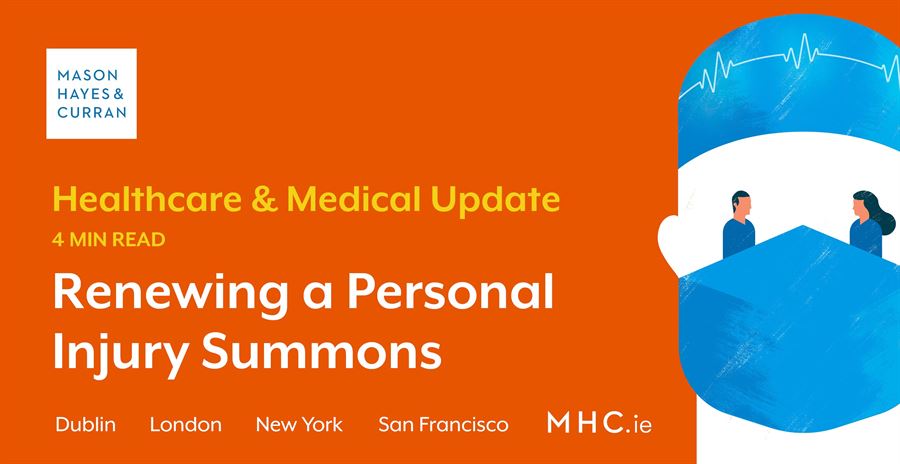Renewing a Personal Injury Summons – Recent Case Law

Earlier this year, the High Court delivered its Judgment in the case of Brereton v The Governors of the National Maternity Hospital & Ors[1]. An application was brought by two defendants in a medical negligence action to set aside the renewal of a personal injury summons granted to a plaintiff on 28 May, 2019. The renewal was granted under the amended Order 8, Rule 1 of the Rules of the Superior Courts (RSC).
The plaintiff issued her summons on 13 March 2018 but did not serve it at that time. The plaintiff submitted that she had been waiting on further expert opinion as to whether or not she had grounds for a claim. This expert opinion was only received in March 2019. Thereafter, the plaintiff submitted that due to inadvertence, the summons was not served within the 12 month time period and expired. Both the plaintiff and her solicitor asserted on affidavit that special circumstances applied to justify the extension.
However, prior to the summons expiring, a pre-litigation letter was served on the solicitor for the second and third named defendants on 10 March 2019 indicating an intention to bring proceedings. In her decision, Ms Justice Hyland concluded the letter made it clear that:
-
A decision had been taken to issue proceedings against the two defendants at that point in time without the necessity to await any further medical reports
-
It was intended that the proceedings would be served before the expiry of the Summons, and
-
It was intended that the summons would be sent with the correspondence
 “Special Circumstances” test
“Special Circumstances” test
All parties to this case agreed that the “special circumstances” test, introduced by way of amendment to the RSC effective since 2019, imposes a higher bar than the test previously in place, being the necessity to show “good reason”.
Order 8, Rule 1(4) of the RSC provides: “The Court on an application… may order a renewal of the original or concurrent Summons for three months from the date of such renewal inclusive where satisfied that there are special circumstances which justify an extension….”
The plaintiff argued that following the decision of Mr Justice Meenan in Murphy v ARF Management Ltd & Ors[2], the “special circumstances” test has been substituted for the “good reason” test.
The defendants relied on the subsequent decision of Mr Justice O’Moore in Ellahi v Governor of Midlands Prison[3]. This decision concluded that the plaintiff must show special circumstances justifying an extension of time to seek leave to renew the summons and show good reason to justify the actual renewal of the summons.
In Ellahi, Mr Justice O’Moore acknowledged the decision in Murphy but noted that in Murphy, Mr Justice Meenan was not adjudicating the particular issue of the test but was considering the issue of whether there could be multiple renewals. Instead, he referred to the decision of Mr Justice Kelly in Whelan v HSE (Unreported, High Court, 31 May 2017) which held that there are two orders to be sought in a renewal application:
-
An order extending time for the making of the application for leave to renew the summons, and
-
An order granting leave to renew the summons
It was held that the special circumstances test applied to the extension of time for leave application but that the good reason test remained the applicable test when considering whether to renew.
Ms Justice Hyland accepted the “distinct ambiguity” in the wording of the new Rule, however she ultimately followed Ellahi and applied the good reason test to the actual renewal of the summons.
Extension of time for leave
In this particular case, Ms Justice Hyland reached the view that there were special circumstances justifying the extension of time to bring the application for renewal, on the following basis:
-
The plaintiff's solicitor intended to serve the summons before the expiry of the 12 month period as outlined in their pre-litigation letter of 10 March 2019
-
The plaintiff's solicitor inadvertently failed to do so
-
The plaintiff's solicitor wrote to the defendants before the expiry of the 12 month period by letter of 10 March 2019, thus informing the defendants of the intended proceedings prior to the expiry of the 12 month period
-
The application to renew the summons was made on 28 May 2019, only 10 weeks after the summons expired, thus the period was relatively short compared to other applications in the context of case law relied upon
-
Given the relatively short delay, there was unlikely to be any significant prejudice to the defendants and none was identified, and
-
Should the timeframe not be extended, the plaintiff was at risk of falling outside of the Statute of Limitations
Ms Justice Hyland refused the application by the defendants to set aside the Order.
Interests of justice and potential hardship
In reaching her decision, Ms Justice Hyland relied on previous case law on the “good reason” test with respect to the necessity to have regard to the interests of justice and potential hardship.
In the 2019 case of Sinead Barry v Conor McCann, Mater Private Hospital, Mater Private Healthcare and Mater Misericordiae University Hospital Ltd[4]; Mr Justice Noonan refused to set aside an Order renewing a summons. This decision was made on the basis that the potential prejudice to the defendants did not outweigh the potential prejudice to the plaintiff if the personal injuries summons was not renewed. The Court held that the balance of hardship favoured the plaintiff and that the interests of justice were served by refusing the defendants' applications.
Conclusion
The evolving area of law as it relates to the renewal of summonses has proved fertile ground for litigation. The ambiguity of the wording of Order 8 has led to differing interpretations in the cases of Murphy and Ellahi. The recent decision in Brereton has provided some welcome clarification.
We conclude with some cautionary advice for legal practitioners:
-
If a summons cannot be served within the 12 month period, an application may be made to the Master of the High Court for a renewal, during that 12 month period. A plaintiff is required to show that reasonable efforts have been made to serve the defendant or that there is "good reason" for the summons to be renewed.
-
If the 12 month time period has expired, then an application needs to be made to the High Court seeking leave to extend time to renew the summons. This application is now a two part process:
-
The plaintiff must apply to the High Court and outline the “special circumstances” justifying the delay in seeking leave to renew the summons, and
-
If special circumstances are established, the "good reason" test applies in relation to actually obtaining an Order to renew the summons
Following the decision in Murphy, referred to above, a summons can now only be renewed on one occasion by the High Court.
For more information on this complex and evolving subject matter, contact a member of our Healthcare & Medical team.
The content of this article is provided for information purposes only and does not constitute legal or other advice.
Share this:



